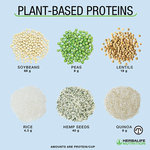

(NAPSI)—As people continue to look for ways to live healthier lifestyles, the plant-based diet continues to gain momentum. A plant-based diet describes a way of eating in which there is an emphasis on plant foods in the form of colorful fruits and vegetables, legumes and whole grains.
Supporting Your Health with Plant-Based Foods
Benefits of eating more plant foods are numerous. Plant foods are nutrient dense, which means that they provide an abundance of nutrients relative to their calorie cost. Fruits, veggies, beans and whole grains are terrific sources of vitamins, minerals and phytonutrients and they’re naturally cholesterol-free. Most contribute a fair amount of fiber, too, so they help to fill you up and keep your digestive tract running smoothly. When you include plenty of these nutritious, filling foods in your diet, it leaves less room in your stomach for less healthy fare.
That said, as the proportion of U.S. consumers who adhere to a vegan diet grows, so does the desire for these people to get more protein. In fact, a Nielsen HomeScan survey recently found that 39 percent of Americans are actively trying to eat more plant-based foods and 60 percent want to get more protein in their diets.
Identifying Sources of Plant-Based Proteins
The major sources of plant-based protein include beans, peas and lentils but whole grains are also important. You may think of whole grains as more of a carb than a protein and that’s true--most grains have more carbohydrate calories than protein calories. But whole grains contribute important essential amino acids to the diet. Most vegans know that in order to get the full complement of essential amino acids (the building blocks of proteins in the body), it’s important to consume both legumes (beans, peas, lentils) and whole grains. Soy is one of the few complete plant-based proteins, meaning it contains the nine essential amino acids that your body cannot produce on its own.
How Much Protein Is Right For You?
Protein is important for maintaining lean body mass. Susan Bowerman, Registered Dietitian and Senior Director of Worldwide Nutrition Education and Training at Herbalife Nutrition says the Institute of Medicine recommends you eat 10 to 35 percent of your total daily calories from protein.
You can estimate your protein needs based on your current body weight. Simply, multiply your body weight by 0.7. The number you get is a reasonable target for the amount of protein, in grams, that you should eat each day. For instance, a woman who weighs 140 pounds should aim for about 100g of protein a day. A 220-pound man should shoot for at least 150g of protein.
Introducing Other Plant-Based Proteins
While most plant-based diets place an emphasis on whole foods, other plant-based foods that are derived from these whole foods can be included. So, in addition to legumes and whole grains (brown or wild rice, oats, quinoa, millet and the like), other sources of plant-based protein include soy milk, soy cheese, soy yogurt, tofu, tempeh, and protein powders made from plant sources such as soy, pea, rice, hemp, oats or quinoa.
To help, Herbalife Nutrition’s Formula 1 Select and Protein Drink Mix Select are two new plant-based nutrition mixes specially formulated with a high-quality blend of pea, quinoa and rice proteins. Formula 1 Select is specially formulated to provide an excellent balance of protein and other key nutrients for optimal nutrition, is an easily digestible source of high-quality plant protein and fiber, and contains no artificial flavors or sweeteners.
Learn More
For further facts, go to www.herbalife.com.
Download high-resolution, print_quality graphic and MS Word document